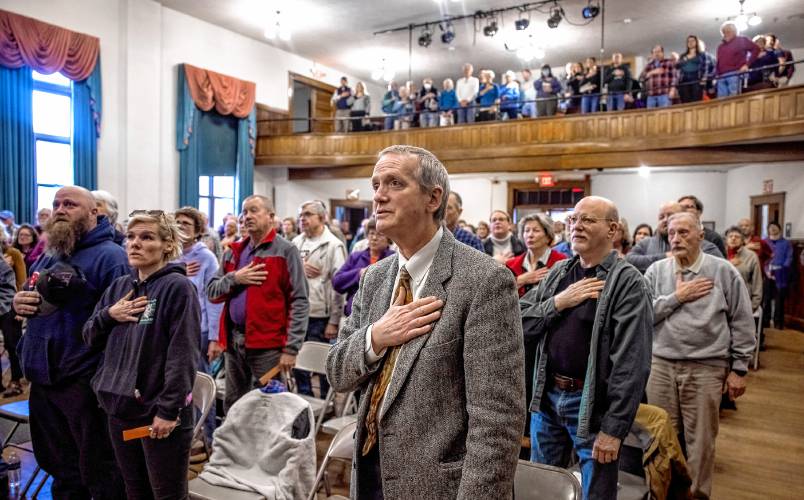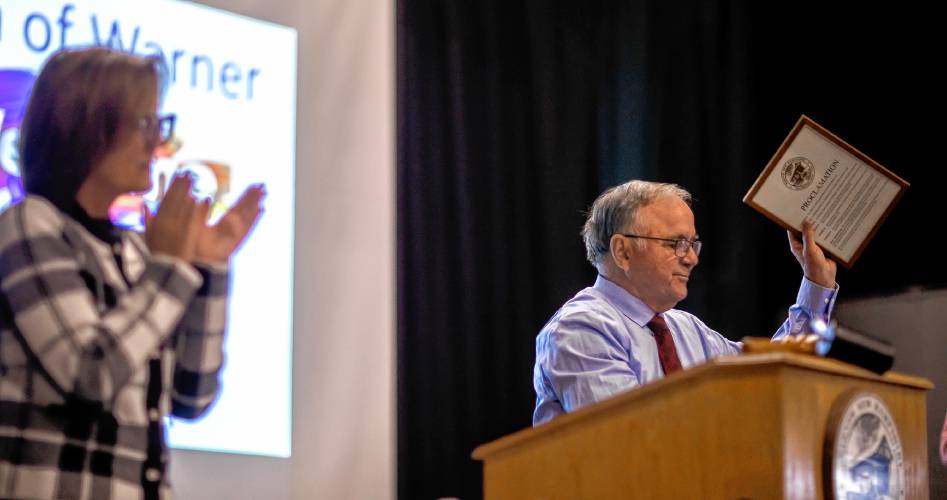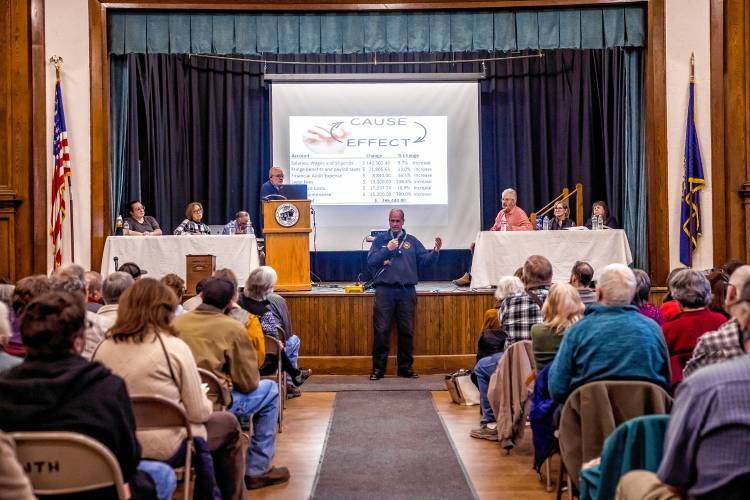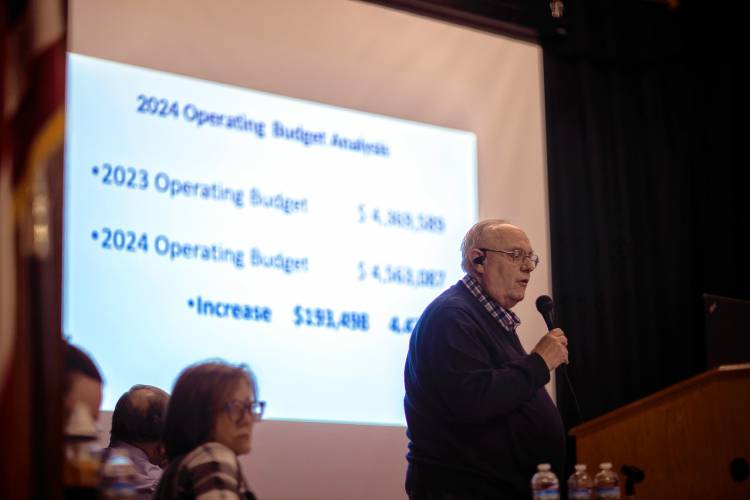In Warner, attempt to cap taxes fails, voters give food pantry free rent
| Published: 03-14-2024 4:49 PM |
Michael Cutting opened Warner’s Town Meeting with a mea culpa. The long-time town budget committee chair admitted town spending over the last five years had gotten out of control.
Since 2019, the town’s annual operating budget has increased from $4 million to $5 million.
“This is not sustainable,” he said. “We cannot keep increasing the budget at a million dollars every five years. The town is not growing at that rate. And we need to start living within our means.”
This year, residents approved a $4.56 million operating budget, just over a 7 percent tax increase. For a home valued at $300,000, residents will see a $237 increase to their annual tax bill.
That builds off of an 18 percent tax increase passed in 2023.
On the stage, select board chair Harry Seidel argued that town services, as is, are essential to the town’s day-to-day function.
“We serve the town without trying to have the town suffer,” said Seidel. “The board of selectmen and the budget committee have checks and balances and this budget maintains the existing services at the lowest possible cost.”
But on the floor, residents is pleaded for lower costs and better consideration for those with less. They brought their own requests to Town Meeting with a series of citizen’s petitions that dominated conversations.
Article continues after...
Yesterday's Most Read Articles
 Boutwell’s is now the biggest candlepin center in the state
Boutwell’s is now the biggest candlepin center in the state
 Home buying gets tougher as prices in New Hampshire continue to rise, outpacing national increase
Home buying gets tougher as prices in New Hampshire continue to rise, outpacing national increase
 Police investigating decomposed body found near Memorial Field
Police investigating decomposed body found near Memorial Field
 Reclaiming Healy Park: A symbol of renewal and a reckoning with homelessness in Concord
Reclaiming Healy Park: A symbol of renewal and a reckoning with homelessness in Concord
 Keep cool Concord: Four city pools open to residents and non-residents
Keep cool Concord: Four city pools open to residents and non-residents
 Pedestrian struck in Pittsfield, officials treat death as suspicious
Pedestrian struck in Pittsfield, officials treat death as suspicious
Therein lies the issue to James Gaffney. The compounding tax increase on residents is straining taxpayers’ pockets over the last few years. No guardrails exist to stop the spending proposals in town. So he proposed a citizen’s petition to cap the annual town tax increase at 4 percent.
“We have a lot of people in this town that live on fixed incomes,” he said. “Year, over year, over year those people cannot afford a double-digit increase to their tax rate.”
While the tax cap proposal failed, tensions ran high in Warner on Wednesday night.
A citizen’s petition asked for the town to suspend construction of the Concord Lake Sunapee Rail Trail until an environmental study on the impact of the 12-mile trail could be completed and reviewed by residents.
Despite pleas from residents, like David Carroll, to consider the ecological impacts of this construction, the petition failed.
“The river is a natural resource. It has a very, very delicate ecosystem that has been processed for 10,000 years,” he said. “We cannot exploit it.”
The warrant would have required the town’s conservation commission to fund the environmental study, which they do not have the capital or capacity to do, according to chair Nancy Martin.
The five-hour Town Meeting also closed the door on a year of turmoil for the town after summer select board resignations and debate over the operations of Warner Connects, the town’s food pantry.
Two select board members resigned in July after a heated meeting debate to charge Warner Connects rent to operate in the town-owned Old Grade School building.
Since October, the nonprofit began paying $400 per month in rent and will continue to do so until their lease is up in June.
This rent comes directly out of the nonprofit’s budget, which relies on donations and federal and state grants, according to pantry coordinator Apryl Blood. To charge rent is to take away from those in need, said Jessica Caswell.
But a citizens’ petition raised the question again, asking residents to allow Warner Connects to operate rent-free at the end of the lease. It passed on a voice vote.
“I don’t think people acknowledge we feed through that food pantry many, many mouths in this town and surrounding communities,” said Caswell. “Food insecurity is a dirty secret that a lot of us don’t like to admit to. So while we talk about how they pay their rent we should recognize that that pantry has been feeding this community and those less fortunate in other communities for years.”
Previously, they operated rent-free, but select board members called on building tenants to sign a lease and contribute to expenses, as thousands of dollars of maintenance lingered.
The necessary repairs – which include fire code and accessibility upgrades – will continue to be a conversation in town, said David Bates. But those repairs do not need to come out of the pocket of the nonprofit tenants.
“We are going to have to work on this for years because none of the solutions are good,” he said. “While I am in support of this, I also want to acknowledge the people on the other side of the question are just reasonable people. They’re not demonic. They’re not hating poor people. They’re trying their best to meet a very difficult problem for our community.”
Last year, the food pantry distributed over $100,000 in foods and commodities to Warner residents and those in surrounding communities. To do this, and allow the nonprofit to retain all revenue, is a commentary on the community, said Martha Bodnarik.
“This is about who we are as a community. This is about providing help that most of us can reach into our pockets and hand to our neighbors,” said Bodnarik. “New England built on helping your neighbor.”














 Granite Geek: The circle of life is painful when watching the species-gets-killed part
Granite Geek: The circle of life is painful when watching the species-gets-killed part Concord’s two Rite Aid stores shutting soon
Concord’s two Rite Aid stores shutting soon
